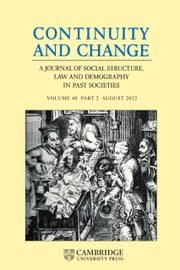Article contents
Migration, family structure and pauper lunacy in Victorian England: admissions to the Devon County Pauper Lunatic Asylum, 1845–1900
Published online by Cambridge University Press: 01 December 1997
Abstract
The lunatic asylum remains one of the most remarkable institutional monuments of the modern world, dominating the social landscape of Victorian Britain and exercising a powerful attraction for social historians of medicine, an attraction almost as great as the spectre of the madhouse for contemporary novelists. Our image of the Victorian asylum is still pervaded to a surprising degree by the gloomy spectacle of the total institution presented by Michel Foucault, though it has been modified by a whole range of institutional and philosophical accounts undertaken in the past three decades. Pioneering studies by researchers such as Andrew Scull have illuminated not only the power exercised by the new asylum superintendents, armed with medical discourses of moral treatment and the early promise of curability, but also the continuing dominance of the ‘mad doctors’ in the sombre years of neo-Darwinian pessimism and eugenics doctrines. More recent contributions to the now enormous literature on the social history of insanity have shifted the focus of attention from earlier concerns with charting the rise of the asylum and the elaboration of medical discourses under the psychiatric gaze of physicians to a detailed reconstruction of the social environment of the asylum and especially to the interplay between familial circumstances and the way institutions responded to the insane. Such concerns were also clearly evident in important earlier studies by Walton, Scull, Digby and others, which drew on fundamental work by Anderson on the changing role of the family during industrialization. These scholars drew attention to the importance of family and kinship relations in the negotiation of a lunatic's passage to the Victorian asylum, as well as the role of wider forces of economic change, population growth and migration in shaping the environment in which decisions about the care of the mad were made.
- Type
- Research Article
- Information
- Copyright
- © 1997 Cambridge University Press
- 5
- Cited by




